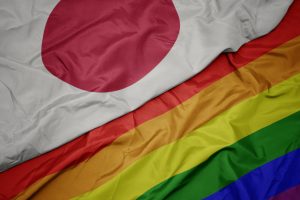On Thursday in Tokyo, Endo Toshiaki – head of the Japanese Liberal Democratic Party (LDP)’s council on general affairs – told reporters that the ruling coalition would submit a bill covering LGBTQ understanding in Japan before the upcoming Group of Seven (G-7) summit in May. Japan is unique among the G-7 as it is the only one of the high-income democracies that does not prohibit discrimination against LGBTQ individuals or legally recognize same-sex unions.
In Asia, only Taiwan recognizes same-sex marriages, but there is a growing movement in the region for increased LGBTQ rights. Last year, Singapore struck down a colonial era law criminalizing gay sex, but announced it would not change marriage laws to recognize same-sex couples.
The LDP has been slow to move on passing a bill protecting sexual minorities, prompting criticism from other Japanese parties and pressure from other G-7 member countries to modernize its stance on LGBTQ protections. The LDP and its coalition partner, Komeito, have ruled Japan for all but four years since 1955 by building a broad coalition of conservative and moderate voters, many of whom live outside of major metropolitan hubs. Conservative opposition within the LDP itself is a major hurdle to passing LGBTQ legislation, even as Japanese society overall has moved toward acceptance.
In the run-up to the last election, six opposition parties promised to present bills providing protections for LGBTQ persons and four agreed to a common policy of legal equality. Business lobbies have complained that the lack of legal rights for LGBTQ persons makes hiring top international talent difficult. Additionally, nearly two-thirds of the Japanese public supports recognizing same-sex marriage, according to a poll from February of this year.
However, the issue has long been controversial within the LDP and conservative party members have voiced objections to drafted versions of the bill that include language such as “discrimination will not be tolerated.” Endo said that the LDP would try to find consensus. Importantly, the bill will not allow for the national government to recognize same-sex marriages.
Regardless, LDP leadership appears to be committed to making a change, with Prime Minister Kishida Fumio signing onto the G-7 communique in 2022 agreeing to protect LGBTQ individuals from discrimination. Earlier this year, Kishida fired a senior aide who made discriminatory remarks about the LGBTQ community, which prompted protests and a new round of discussions about the issue and the bill.
G-7 member countries have expressed hopes that Japan would pass a bill before the upcoming summit as a show of commitment to shared values among the democratic member countries, contrasting with the discriminatory stances that countries such as Russia and China have taken toward LGBTQ individuals.
Kishida may be hoping passing this bill will continue his cabinet’s recovery in the polls. In March, Kishida’s cabinet had a 48 percent approval rating, up from 39 percent at the start of the year. Under his leadership, the LDP has focused on taking popular stances, such as supporting Ukraine in the war against Russia and relaxing pandemic restrictions. Bringing his conservative members into agreement on a popular pro-LGBTQ bill would be another victory for Kishida in the run-up to the next round of national elections, which must take place before October 2025 and for his own re-election bid as president of the LDP later next year.

































